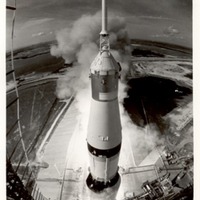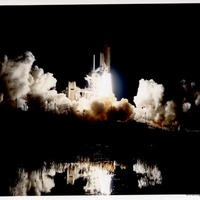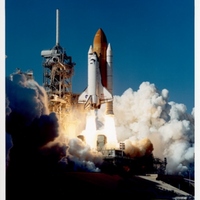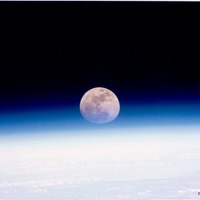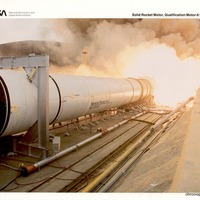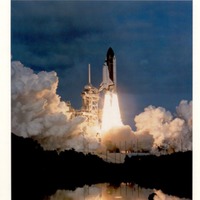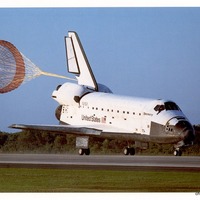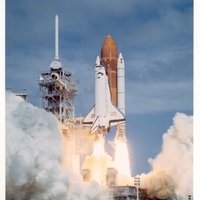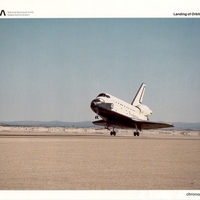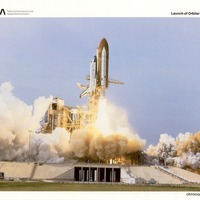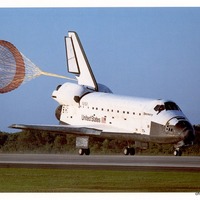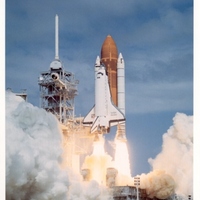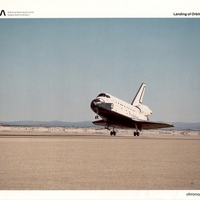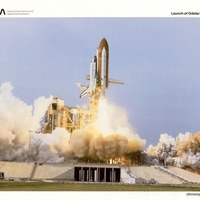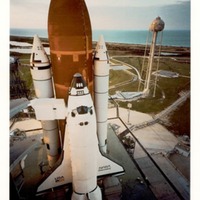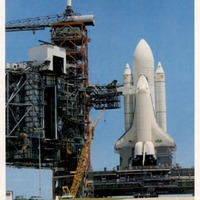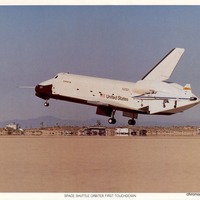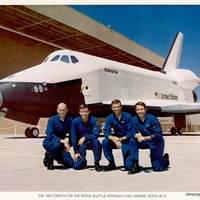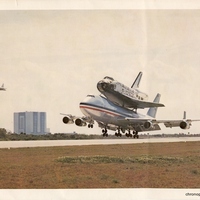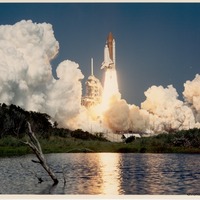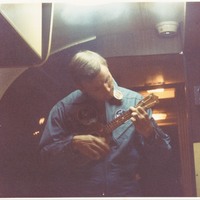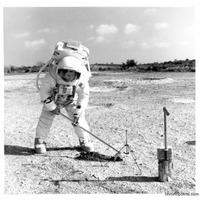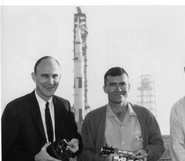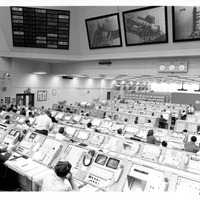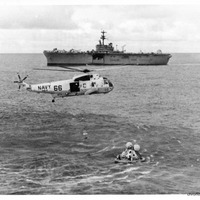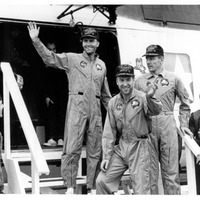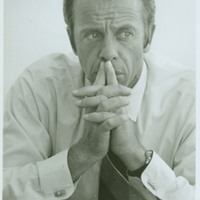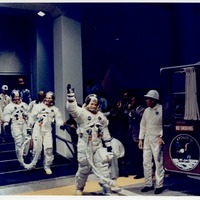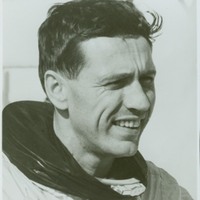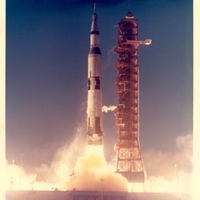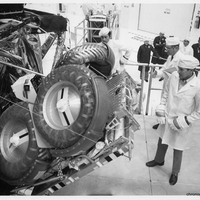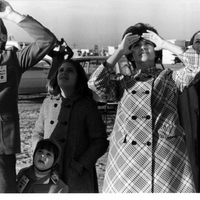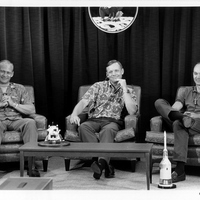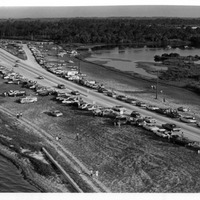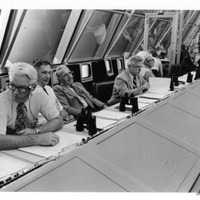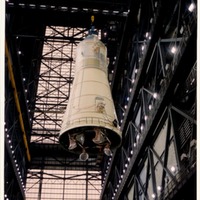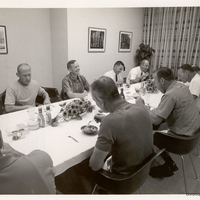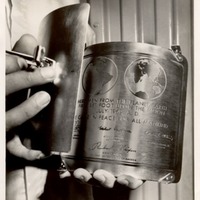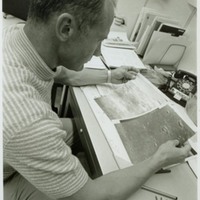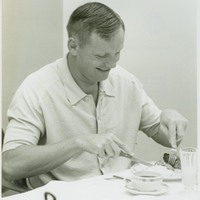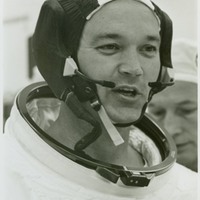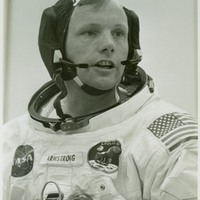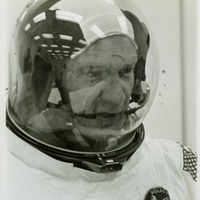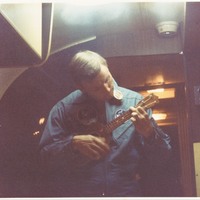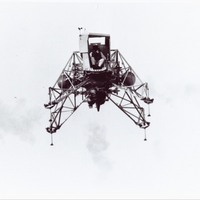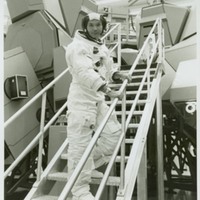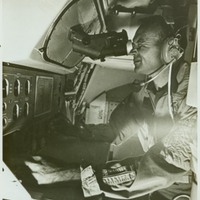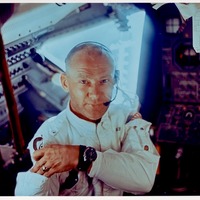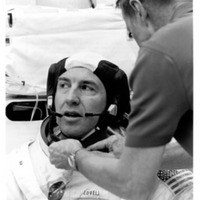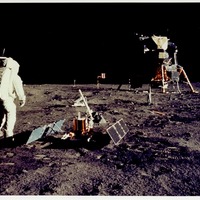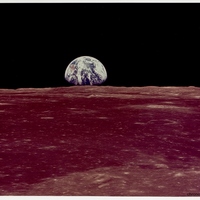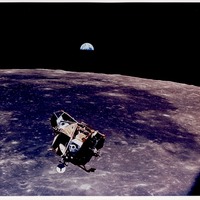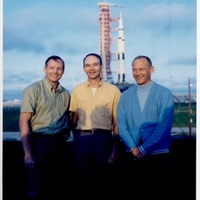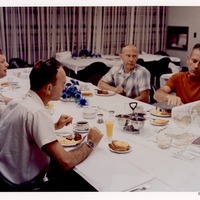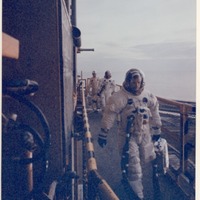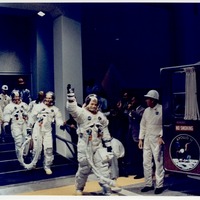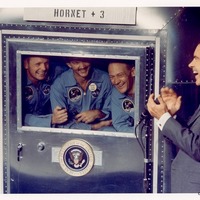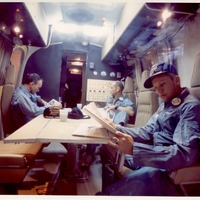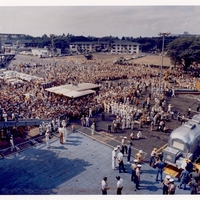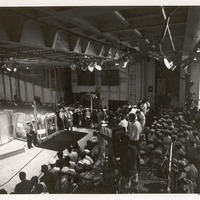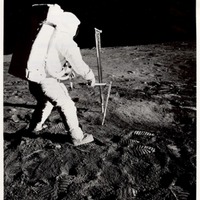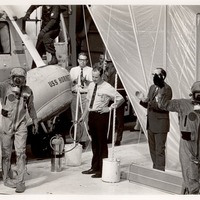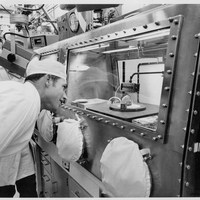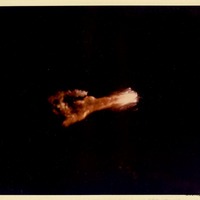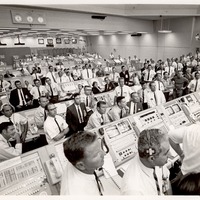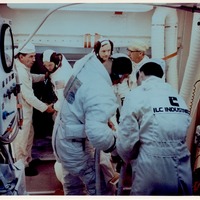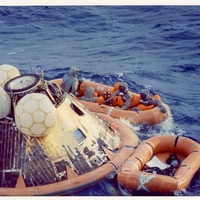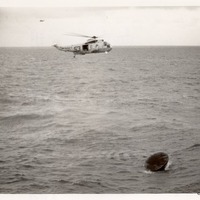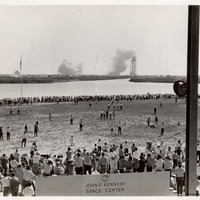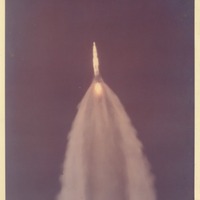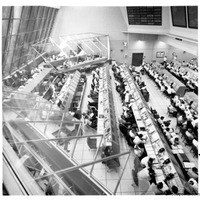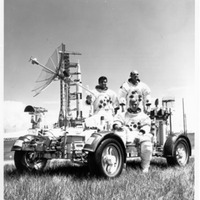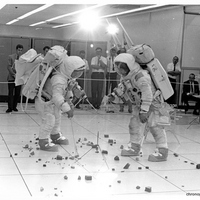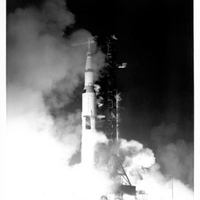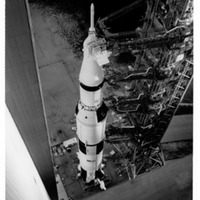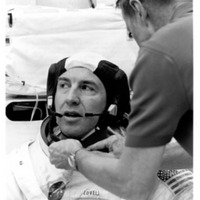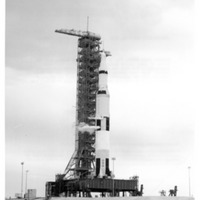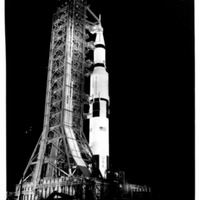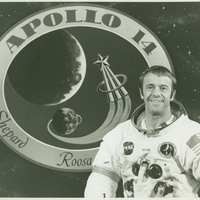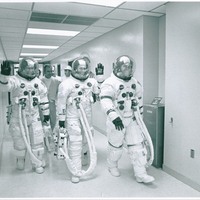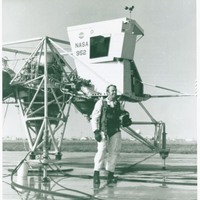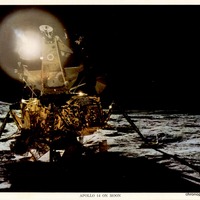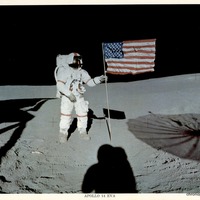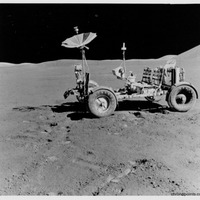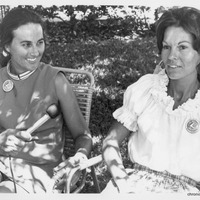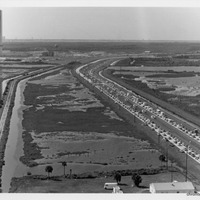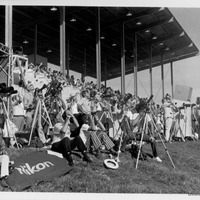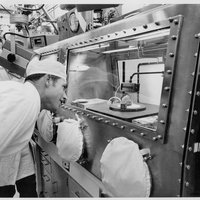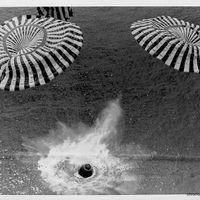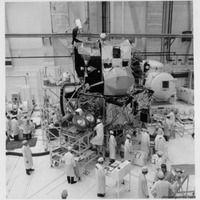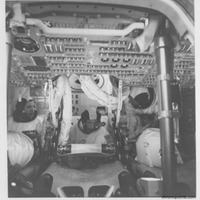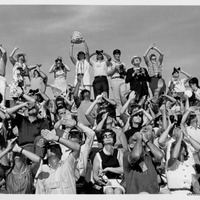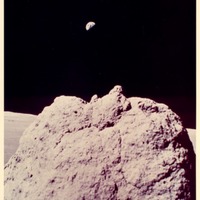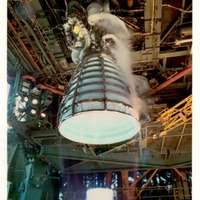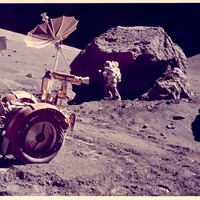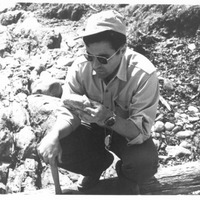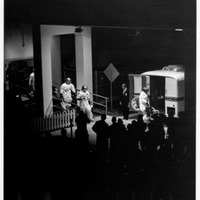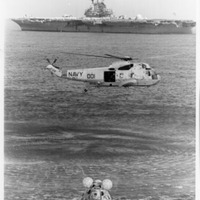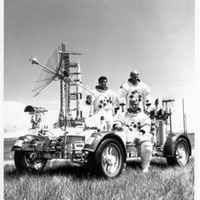Browse Items (194 total)
- Collection: Florida Space Coast History Collection
Apollo 11 Liftoff
Space Shuttle Discovery Launch for STS-103
Tags: Hubble Space Telescope; John F. Kennedy Space Center; Kennedy Space Center; KSC; launch; Launch Complex 39B; Launch Pad 39B; LC-39B; Merritt Island; NASA; National Aeronautics and Space Administration; OV-103; space; Space Shuttle Discovery; Space Shuttle Program; Space Shuttles; Space Transportation System; STS; STS-103
Space Shuttle Discovery Launch for STS-95
Tags: John F. Kennedy Space Center; Kennedy Space Center; KSC; launch; Launch Complex 39B; Launch Pad 39B; LC-39B; Merritt Island; NASA; National Aeronautics and Space Administration; OV-103; space; Space Shuttle Discovery; Space Shuttle Program; Space Shuttles; Space Transportation System; STS; STS-95
View of the Moon from Earth's Orbit
Solid Rocket Motor, Qualification Motor-6 Static Test
Space Shuttle Columbia Lifts Off Into Space
Landing of STS-56 Space Shuttle Discovery
Space Shuttle Discovery Launch for STS-26
Tags: John F. Kennedy Space Center; Kennedy Space Center; KSC; launch; Launch Complex 39B; Launch Pad 39B; LC-39B; Merritt Island; NASA; National Aeronautics and Space Administration; OV-103; space; Space Shuttle Discovery; Space Shuttle Program; Space Shuttles; Space Transportation System; STS; STS-26; TDRS-C; Tracking and Data Relay Satellite
Space Shuttle Atlantis Returning to Earth After Its First Mission
Space Shuttle Columbia Launch
Tags: ESA; European Space Agency; John F. Kennedy Space Center; Kennedy Space Center; KSC; Launch Complex 39A; Launch Pad 39A; LC-39A; Merritt Island; NASA; National Aeronautics and Space Administration; OV-102; space; Space Shuttle Columbia; Space Shuttle Program; Space Shuttles; Space Transportation System; Spacelab; Spacelab 1; STS; STS-9
Landing of STS-56 Space Shuttle Discovery
Space Shuttle Discovery Launch for STS-26
Tags: John F. Kennedy Space Center; Kennedy Space Center; KSC; launch; Launch Complex 39B; Launch Pad 39B; LC-39B; Merritt Island; NASA; National Aeronautics and Space Administration; OV-103; space; Space Shuttle Discovery; Space Shuttle Program; Space Shuttles; Space Transportation System; STS; STS-26; TDRS-C; Tracking and Data Relay Satellite
Space Shuttle Atlantis Returning to Earth After Its First Mission
Space Shuttle Columbia Launch
Tags: ESA; European Space Agency; John F. Kennedy Space Center; Kennedy Space Center; KSC; Launch Complex 39A; Launch Pad 39A; LC-39A; Merritt Island; NASA; National Aeronautics and Space Administration; OV-102; space; Space Shuttle Columbia; Space Shuttle Program; Space Shuttles; Space Transportation System; Spacelab; Spacelab 1; STS; STS-9
Space Shuttle Discovery on Launch Pad 39A
Space Shuttle Enterprise on Launch Pad 39A
Tags: crawler-transporter; John F. Kennedy Space Center; Kennedy Space Center; KSC; Launch Complex 39A; Launch Pad 39A; LC-39A; Merritt Island; NASA; National Aeronautics and Space Administration; space; Space Shuttle Enterprise; Space Shuttle Program; Space Shuttles; Space Transportation System; STS; verification test
Space Shuttle Enterprise Landing at Dryden Flight Research Center
Crew 1 and Crew 2 with Space Shuttle Enterprise
Tags: Approach and Landing Tests; astronauts; C. Gordon Fullerton; Charles Gordon Fullerton; Crew 1; Crew 2; Fred Haise; Fred Wallace Haise, Jr.; Joe Engle; Joe Henry Engle; Palmdale; Richard H. Truly; Richard Harrison Truly; Rockwell International; Space Shuttle Enterprise; Space Shuttle Program; Space Shuttles; Space Transportation System; STS
Boeing 747 Transporting the Space Shuttle Columbia
Tags: Boeing 747; John F. Kennedy Space Center; Kennedy Space Center; KSC; Mate/Demate Device; Merritt Island; NASA; National Aeronautics and Space Administration; OV-102; Shuttle Landing Facility; space; Space Shuttle Columbia; Space Shuttle Program; Space Shuttles; Space Transport; Space Transportation System; STS
Space Shuttle Launch
Astronaut Neil Armstrong in Mobile Quarantine Facility
Apollo 13 Backup Astronaut John Young
Apollo 13 Crew with Launch Vehicle
Tags: Apollo 13; Apollo Project; AS-508; astronauts; Fred Haise; Fred Wallace Haise, Jr.; James Arthur Lovell, Jr.; Jim Lovell; John F. Kennedy Space Center; Ken Mattingly; Kennedy Space Center; KSC; Launch Complex 39A; Launch Pad 39A; launch vehicle; LC-39A; Merritt Island; NASA; National Aeronautics and Space Administration; Project Apollo; Saturn V; space; Thomas Kenneth Mattingly II
Test of Launch Procedures for Apollo 13
Recovery Helicopter Above Apollo 13 Capsule
Apollo 13 Crew on the USS Iwo Jima After Recovery
Underwater Testing Materials for the Skylab Heat Shield
Astronaut Alan Shepard
Apollo 11 Crew Entering the Transfer Van to Launch Pad 39A
Apollo 7 Astronaut Donn F. Eisele
Apollo 4 Launch
Engineers Checking Deployment of Apollo 16's Lunar Rover
Lovell Family Observing the Apollo 8 Launch
Apollo 11 Crew at Pre-Launch Press Conference
Crowds Observing the Apollo 11 Launch Along Florida State Road A1A
Tags: Apollo 11; Apollo Project; Bee Line; Florida State Road 528; Florida State Road A1A; John F. Kennedy Space Center; Kennedy Space Center; KSC; launch; Martin Andersen Beachline Expressway; Martin Andersen Bee Line Expressway; Merritt Island; NASA; National Aeronautics and Space Administration; Project Apollo; space; SR 528; SR A1A
Larry Summer Filming the Launch Control Center
Apollo Command/Service Module and Lunar Module
Apollo 11 Crew at the Pre-Flight Dinner
Tags: Apollo Project; astronauts; Bill Anders; Buzz Aldrin; Deke Slayton; Donald Kent Slayton; Edwin Eugene Aldrin, Jr.; Fred Haise; Fred Wallace Haise, Jr.; James Arthur Lovell, Jr.; Jim Lovell; John F. Kennedy Space Center; Ken Mattingly; Kennedy Space Center; KSC; Manned Spacecraft Operations Building; Merritt Island; Michael Collins; MSOB; NASA; National Aeronautics and Space Administration; Neil Alden Armstrong; Neil Armstrong; Project Apollo; Ron Evans; Ronald Ellwin Evans, Jr.; Ronald Evans; space; Thomas Kenneth Mattingly II; William Alison Anders; William Anders
Apollo 11 Lunar Module Plaque
Apollo 11 Astronaut Buzz Aldrin Examining Lunar Surface Photographs
Apollo 11 Astronaut Neil Armstrong at Pre-Launch Breakfast
Apollo 11 Astronaut Michael Collins
Apollo 11 Astronaut Neil Armstrong
Apollo 11 Astronaut Buzz Aldrin
Astronaut Neil Armstrong in Mobile Quarantine Facility
Apollo 11 Astronaut Neil Armstrong Practicing Moon Landing
Astronaut Michael Collins During Apollo 11 Training
Astronaut Michael Collins in the Command Module Procedures Simulator
Apollo 11 Astronaut Buzz Aldrin Aboard the Lunar Module
Astronaut Jim Lovell During Spacesuit Testing
Apollo 11 on the Moon
Earth on the Lunar Horizon During the Apollo 11 Mission
Apollo 11's Ascent From the Moon
Apollo 11 Crew at Launch Complex 39A
Apollo 11 Crew Breakfast at John F. Kennedy Space Center Before Flight
Tags: Apollo 11; Apollo Project; astronauts; Bill Anders; Buzz Aldrin; Deke Slayton; Donald Kent Slayton; Edwin Eugene Aldrin, Jr.; John F. Kennedy Space Center; Kennedy Space Center; KSC; Manned Spacecraft Operations Building; Merritt Island; Michael Collins; MSOB; NASA; National Aeronautics and Space Administration; Neil Alden Armstrong; Neil Armstrong; Project Apollo; space; William Alison Anders; William Anders
Astronauts Boarding Apollo 11
Tags: Apollo 11; Apollo Project; Buzz Aldrin; Edwin Eugene Aldrin, Jr.; John F. Kennedy Space Center; Kennedy Space Center; KSC; Launch Complex 39A; Launch Pad 39A; Launch Umbilical Tower; LC-39A; LUT; Merritt Island; Michael Collins; NASA; National Aeronautics and Space Administration; Neil Alden Armstrong; Neil Armstrong; Project Apollo; space
Apollo 11 Crew Entering the Transfer Van to Launch Pad 39A
Quarantined Apollo 11 Crew with President Richard Nixon Aboard the USS Hornet
Apollo 11 Crew in the Mobile Quarantine Facility
Offloading the Apollo 11 Crew in the Mobile Quarantine Facility
President Richard Nixon Greeting the Apollo 11 Crew Aboard the USS Hornet
Astronaut Buzz Aldrin on the Moon
Apollo 11 Crew on the USS Hornet After Recovery
Astronaut David Scott Examining the Genesis Rock
Apollo 11 Reentering Earth's Atmosphere
Launch Control Center During the Launch of Apollo 11
Apollo 11 Crew Entering the Capsule for Testing
Tags: Apollo 11; Apollo Project; Buzz Aldrin; Edwin Eugene Aldrin, Jr.; Günter F. Wendt; John F. Kennedy Space Center; Kennedy Space Center; KSC; Launch Complex 39A; Launch Pad 39A; LC-39A; Merritt Island; Michael Collins; NASA; National Aeronautics and Space Administration; Neil Alden Armstrong; Neil Armstrong; Project Apollo; space; White Room
Recovery of Apollo 11 Crew
Splashdown and Recovery of Apollo 11
Press Corps During the Launch of Apollo 11
Apollo 11 Launch
Rehearsal at John F. Kennedy Space Center's Launch Control Center
Apollo 17 Crew on a Lunar Rover
Tags: Apollo 17; Apollo Project; Eugene Andrew Cernan; Eugene Cernan; Gene Cernan; Harrison Hagan Schmitt; Harrison Schmitt; Jack Schmitt; John F. Kennedy Space Center; Kennedy Space Center; KSC; Launch Complex 39A; LC-39A; lunar rover; Merritt Island; NASA; National Aeronautics and Space Administration; Project Apollo; Ron Evans; Ronald Ellwin Evans, Jr.; Ronald Evans; Saturn V; space
Apollo 12 Crew Training to Use Tools on the Moon
Apollo 12 Liftoff at Launch Pad 39A
Apollo 12 Rollout From Vehicle Assembly Building to Launch Pad 39A
Astronaut Jim Lovell During Spacesuit Testing
Apollo 13 Being Fueled Before Launch at Launch Complex 39A
Apollo 13 Before Launch at Launch Complex 39A
Astronaut Alan Shepard
Apollo 14 Crew in the Manned Spacecraft Operations Building at John F. Kennedy Space Center
Tags: Al Shepard; Alan Bartlett Shepard, Jr.; Alan Shepard; Apollo 14; astronauts; Ed Mitchell; Edgar Dean Mitchell; Edgar Mitchell; John F. Kennedy Space Center; Kennedy Space Center; KSC; Manned Spacecraft Operations Building; Merritt Island; MSOB; NASA; National Aeronautics and Space Administration; space; Stu Roosa; Stuart Allen Roosa; Stuart Roosa
Astronaut Alan Shepard with a Lunar Landing Training Vehicle
Apollo 14 on Moon
Apollo 14 EVA
Apollo 15's Lunar Rover on the Moon
Ann Lurton Scott and Mary Ellen Irwin
Kennedy Parkway North During the Apollo 15 Launch
Press Corps Observing the Apollo 15 Launch
Astronaut David Scott Examining the Genesis Rock
Apollo 15 Splashdown in the Pacific Ocean
Testing for Apollo 15's Lunar Rover
Apollo 15 Crew Testing Apollo Spacecraft
Tags: Al Worden; Alfred Merrill Worden; Alfred Worden; Apollo 15; astronauts; Dave Scott; David Randolph Scott; David Scott; James Benson Irwin; James Irwin; Jim Irwin; John F. Kennedy Space Center; Kennedy Space Center; KSC; Merritt Island; NASA; National Aeronautics and Space Administration; simulation; space
Crowd Observes the Apollo 15 Launch
Earth as Viewed From the Moon
Space Shuttle Main Engine (SSME) Test
Astronaut Harrison Schmitt on the Moon
Astronaut Harrison Schmitt During Training
Apollo 17 Crew Boarding a Transfer Van
Tags: Apollo 17; Apollo Project; Eugene Andrew Cernan; Eugene Cernan; Gene Cernan; Harrison Hagan Schmitt; Harrison Schmitt; Jack Schmitt; John F. Kennedy Space Center; Kennedy Space Center; KSC; Manned Spacecraft Operations Building; Merritt Island; MSOB; NASA; National Aeronautics and Space Administration; Project Apollo; Ron Evans; Ronald Ellwin Evans, Jr.; Ronald Evans; space; transfer van
Apollo 17 Splashdown
Apollo 17 Crew on a Lunar Rover
Tags: Apollo 17; Apollo Project; Eugene Andrew Cernan; Eugene Cernan; Gene Cernan; Harrison Hagan Schmitt; Harrison Schmitt; Jack Schmitt; John F. Kennedy Space Center; Kennedy Space Center; KSC; Launch Complex 39A; LC-39A; lunar rover; Merritt Island; NASA; National Aeronautics and Space Administration; Project Apollo; Ron Evans; Ronald Ellwin Evans, Jr.; Ronald Evans; Saturn V; space
